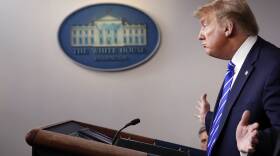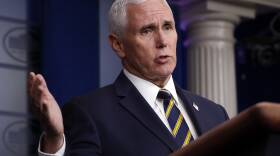EXPLORE MORE
Monday on BPR:
Former Boston Globe editor Brian McGrory
Food policy analyst Corby Kummer
Boston Medical Center’s Dr. Katherine Gergen Barnett & Beautiful Way Foundation's Tamika Jackson
Chef Ken Oringer
Recent segments
-
Trump's Latest Medical Suggestions Are 'Reckless,' Says John King
The president suggested earlier this week that disinfectants could be injected in human bodies to fight the coronavirus. -
Emily Rooney Returns With 'Even Stranger’ List of Coronavirus Quirks
The "Beat the Press" host said coronavirus anxiety has her panic-running her dishwasher and drinking more coffee than ever. -
Paul Reville Calls Move To Online Learning A 'Sputnik Kind Of Moment' For Educators
The former state education secretary cautioned that weak implementation could further widen the state’s achievement gap. -
Jared Bowen: The Berkshires Are Being Hit Hard By Coronavirus Closures
With many of the region's popular summer season arts offerings cancelled, the economy will take a hit. -
Is The Pandemic Inspiring People To Buy A Gun?
According to a recent poll conducted by Suffolk University and the Boston Globe between March 24-27, less than a fifth of respondents said they owned a gun, but one in seven responded “yes” when asked if they wished they did. -
Chuck Todd On Vice President Pence's 'Filibustering'
The Vice President, on NBC's Meet The Press with Chuck Todd, refused to answer direct questions.
Listen to previous shows
-

Best Of BPR 9/08: Cliff Notez & Boston Seafood Festival
Best Of BPR 9/08: Cliff Notez & Boston Seafood Festival -

BPR Full Show 9/8: How to Shuck an Oyster
BPR Full Show 9/8: How to Shuck an Oyster -

BPR Full Show 9/7: America's Got Lavendar Darcangelo
BPR Full Show 9/7: America's Got Lavendar Darcangelo -

Best Of BPR 9/07: Lavender Darcangelo's Got Talent & Suzy Eddie Izzard's Running For Parliament
Best Of BPR 9/07: Lavender Darcangelo's Got Talent & Suzy Eddie Izzard's Running For Parliament -

BPR Full Show 9/6: Not In This Economy
BPR Full Show 9/6: Not In This Economy







